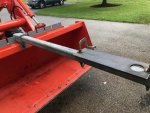Until I get a LOT better at welding, it seems like I can kludge together a lot of useful stuff, if I can drill holes (from 1/4" to maybe 3/4") in steel plates (up to maybe 3/8" thick). So far so good?
I have a Dewalt DCH133 rotary hammer drill that so far I've used only to drill holes in concrete. But it looks like I can also use this tool to drill holes in steel?
Any tips? Good bits? pilot holes? coolants?
I have a Dewalt DCH133 rotary hammer drill that so far I've used only to drill holes in concrete. But it looks like I can also use this tool to drill holes in steel?
Any tips? Good bits? pilot holes? coolants?


